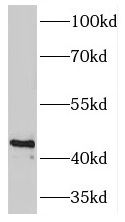Products
PDK2 antibody
Category:
Research Area:
- SPECIFICATIONS
- Product Name
- PDK2 antibody
- Catalogue No.
- FNab06277
- Size
- 100μg
- Form
- liquid
- Purification
- Immunogen affinity purified
- Purity
- ≥95% as determined by SDS-PAGE
- Clonality
- polyclonal
- Isotype
- IgG
- Storage
- PBS with 0.02% sodium azide and 50% glycerol pH 7.3, -20℃ for 12 months(Avoid repeated freeze / thaw cycles.)
Immunogen
- Immunogen
- pyruvate dehydrogenase kinase, isozyme 2
- Alternative Names
- PDHK2 antibody
- UniProt ID
- Q15119
- Observed MW
- 46KD
Application
- Tested Applications
- ELISA, WB, IHC, IP
- Recommended dilution
- WB: 1:500-1:2000; IP: 1:200-1:1000; IHC: 1:20-1:200
Validated Images
 human heart tissue were subjected to SDS PAGE followed by western blot with FNab06277(PDK2 antibody) at dilution of 1:500
human heart tissue were subjected to SDS PAGE followed by western blot with FNab06277(PDK2 antibody) at dilution of 1:500
 IP Result of anti-PDK2 (IP:FNab06277, 4ug; Detection:FNab06277 1:500) with mouse skeletal muscle tissue lysate 2000ug.
IP Result of anti-PDK2 (IP:FNab06277, 4ug; Detection:FNab06277 1:500) with mouse skeletal muscle tissue lysate 2000ug.
 Immunohistochemistry of paraffin-embedded human brain using FNab06277(PDK2 antibody) at dilution of 1:100
Immunohistochemistry of paraffin-embedded human brain using FNab06277(PDK2 antibody) at dilution of 1:100
- Background
- Kinase that plays a key role in the regulation of glucose and fatty acid metabolism and homeostasis via phosphorylation of the pyruvate dehydrogenase subunits PDHA1 and PDHA2. This inhibits pyruvate dehydrogenase activity, and thereby regulates metabolite flux through the tricarboxylic acid cycle, down-regulates aerobic respiration and inhibits the formation of acetyl-coenzyme A from pyruvate. Inhibition of pyruvate dehydrogenase decreases glucose utilization and increases fat metabolism. Mediates cellular responses to insulin. Plays an important role in maintaining normal blood glucose levels and in metabolic adaptation to nutrient availability. Via its regulation of pyruvate dehydrogenase activity, plays an important role in maintaining normal blood pH and in preventing the accumulation of ketone bodies under starvation. Plays a role in the regulation of cell proliferation and in resistance to apoptosis under oxidative stress. Plays a role in p53/TP53-mediated apoptosis.



